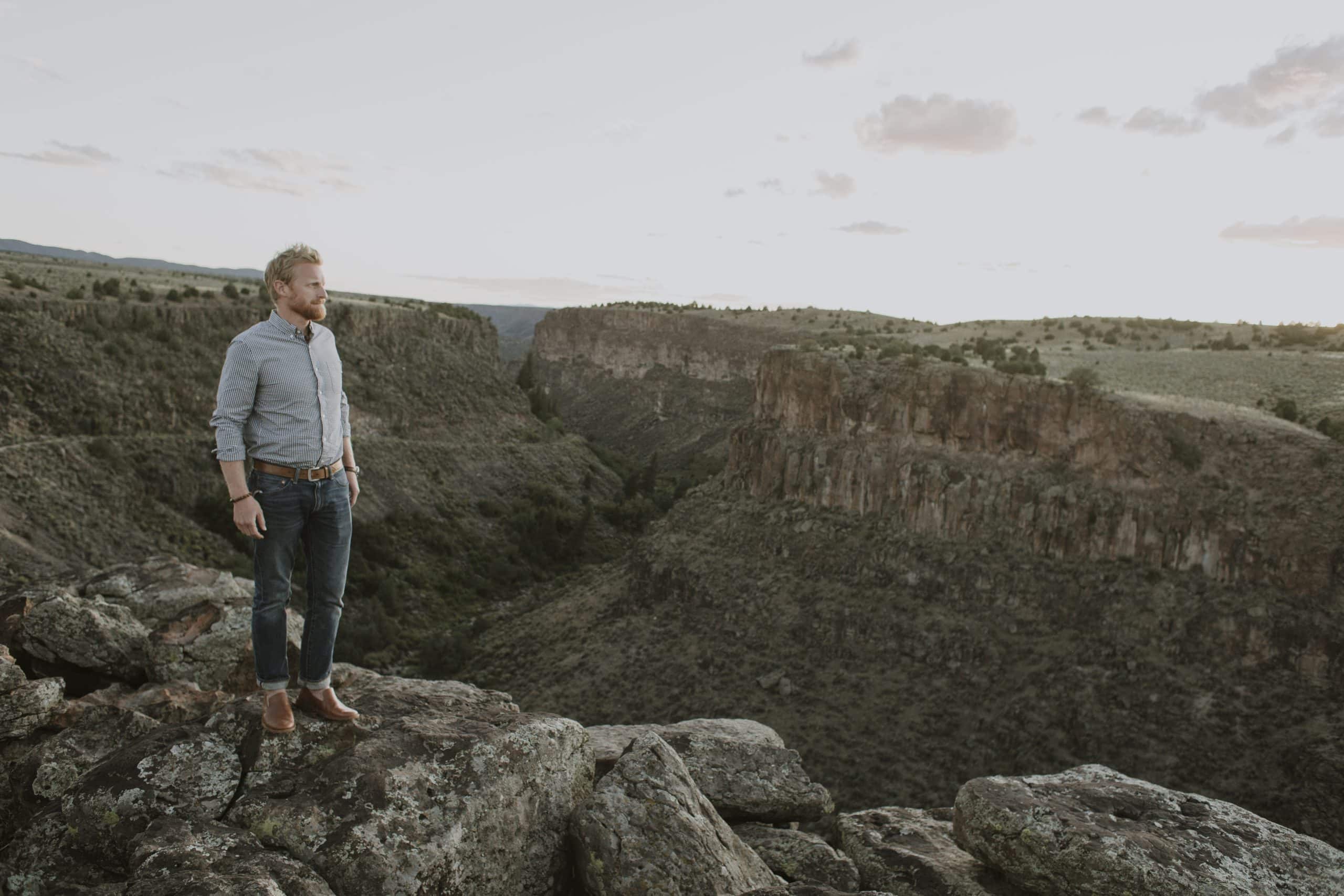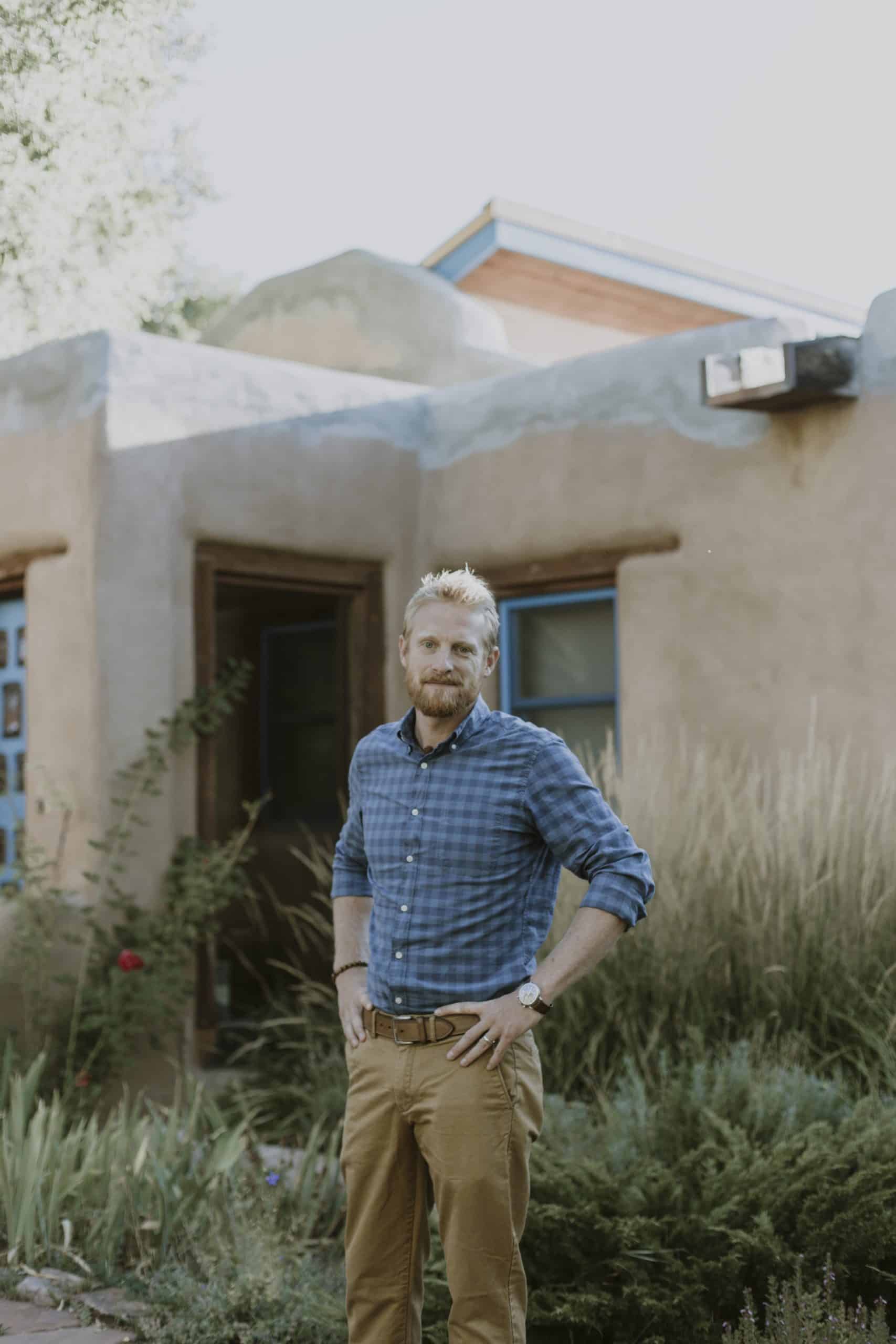July 17, 2020
By David Goodman
Kyle Tisdel takes on big oil and gas and wins!
Kyle Tisdel JD’05 and his colleague took a seat at the large, oak counsel’s table in the federal courtroom in Albuquerque, New Mexico. The cavernous chamber made the two public interest attorneys feel small. So did the scene at the table for opposing counsel, where 15 attorneys jockeyed for space. They included lawyers from the U.S. Departments of Justice and Interior and a clutch of attorneys representing the oil and gas industry who had flown in from New York and Washington, D.C.
It was, Tisdel, recalls of the 2015 court appearance, “a David and Goliath situation.”
Tisdel, 41, a wiry advocate with a face framed by a rich red beard, does not represent deep-pocketed titans of the fossil fuel industry. A 2005 graduate of Vermont Law School, he is now the climate and energy director in the Taos office of the Western Environmental Law Center (WELC), a public interest law firm that specializes in cases involving environmental protection, climate change, and defending frontline communities in the West. He has traveled to this courtroom via Navajo communities in the Four Corners region of the Southwest where he regularly meets with ranchers, elders, and ordinary people trying to protect their land and water from fracking pollution.
This land has “a rich mix of cultural and historical resources, but you also have contemporary Navajo communities that, despite living in the shadow of two coal-fired power plants, don’t have running water or electricity,” Tisdel explains. This is where the federal Bureau of Land Management (BLM) decided to permit some 4,000 fracking wells to be developed. It is a familiar story of big oil and gas versus powerless little guys. In the usual telling, the regular folks always lose.
Kyle Tisdel is out to change that story.

WELC sued in 2015 on behalf of the Diné Citizens Against Ruining Our Environment, the San Juan Citizens Alliance, WildEarth Guardians, and the Natural Resources Defense Council to block the BLM from approving the oil and gas wells in the Greater Chaco region, an area that is home to the Navajo Nation and is sacred to many tribes. The plaintiffs lost the first rounds in the lower court and the 10th Circuit Court. But in May 2019, Tisdel and WELC won big: the 10th Circuit Court of Appeals ruled that the BLM had violated the National Environmental Policy Act (NEPA) by failing to consider the cumulative impacts of the numerous fracked wells.
The Chaco decision “will create significant leverage to reform the federal public lands oil and gas program,” says Erik Schlenker-Goodrich, executive director of WELC, and Tisdel’s boss.
Schlenker-Goodrich credits Tisdel as “a wickedly smart architect of our strategy of challenging oil and gas extraction in the American West. His work has proven immensely successful. He has won a string of precedent-setting cases that are reshaping how the federal government must account for the climate crisis and how it is affecting our public lands. It will require BLM to account for both indirect downstream oil and gas emissions on public lands as well as cumulative emissions.”
THE LAW BY WAY OF INDIA
Kyle Tisdel took a circuitous path to becoming a public interest lawyer: he walked away from the law before coming back to it. Tisdel was born in Detroit, grew up outside of Chicago, and earned a bachelor’s degree in international relations from Michigan State University. “I had a passion for environmental protection early on,” he says. “When I decided on law school, I knew I wanted to practice public interest environmental law, and VLS was at the top of that list.” While at VLS, he worked at the Environmental Law Clinic under Professor Pat Parenteau and was the editor-in-chief of the Vermont Journal of Environmental Law.
After graduating from VLS, Tisdel moved to Washing- ton state. He couldn’t land a public interest law job, so he went to work for a private law firm that handled a number of environmental cases. The job left him wanting more. “I was learning how to represent clients and file cases, but as that learning curve lessened, I had this moment when I realized that I didn’t go to law school to do this.”
Tisdel decided that he needed to “reground.” He resigned from the law firm and traveled to India, where he volunteered at ashrams. Six months later, Tisdel returned to the United States and rebooted his life and career. He moved to Colorado and opened a private practice in the small mountain town of Silverton. It was there that he met his wife, Dillon, and the couple soon moved to Taos, New Mexico. They are now parents of three small children.
When he arrived in Taos, Tisdel began doing some work for WELC. Soon after, he landed the kind of public interest law job that he’d dreamed about.
A JOB AND A MISSION

Kyle Tisdel leans back and takes in the fall foliage as we sit outside the VLS library on a brisk autumn day. It is his first time back to campus since he graduated in 2005. Balancing a family of five and being a sought-after public interest attorney has made his life frenetic, but he smiles easily and enjoys the moment. He wears a bracelet of wooden meditation beads that he got in India. “It’s just a little reminder for me to stay grounded and balanced in how I conduct myself,” he tells me.
That balance is evident to his colleagues. “He definitely got into this work because he’s passionate about it,” says Megan O’Reilly, an attorney and former colleague at WELC who now works for the Regulatory Assistance Project. “At the same time, he’s very calm and organized about his work. That makes him a very effective litigator.”
Tisdel explains the “theory of change” that underlies WELC’s work. “Our work is really grounded in the communities where we operate. We work with more than 150 partner organizations around the West and the country. Our work is cradle to grave: come in at the administrative stage, help smaller community groups or regional or national groups in coalition, engage with agencies at the earliest stage of the decision- making process. If an agency fails in decision-making, then we litigate in federal court. There is a full arc in terms of representation.”
Working among some of the poorest communities in the country, Tisdel is exposed to plenty of despair. I ask him what gives him hope. “Having agency and taking action is actually the best medicine for that type of despair. The workaround Chaco is also about community organizing and showing up and letting those people know that you are there and working with them to try and secure a better future. The organizing aspect of that is not what attorneys typically do—other organizations focus on that. But the coalition, that includes leaders in the Navajo Nation and community members, is a robust combination of folks coming together to create lasting solutions.”
There is something else that gives hope both to him and the people he represents: winning.
“In the last two years, we’ve achieved a string of six wins in federal court against no defeats on these issues of climate and holding the federal government accountable to the climate and the timeline of climate change,” he asserts.
These wins have national implications. “The theory of these cases that we have brought under NEPA is that we are building a wall of precedent where the federal government is needing to analyze the full range of climate impacts.”
Noting that about one-fourth of all greenhouse gas emissions are a direct result of exploitation on public lands, Tisdel says, “We simply cannot address the climate crisis without accounting for and changing our decision-making with respect to that exploitation and the federal government’s authorization of that development.”
THE URGENCY OF NOW
Kyle Tisdel’s mission to tackle the pressing issues of our time has led him to enter a bigger arena.
In August 2019, he announced his candidacy for the 3rd Congressional District of northern New Mexico. He is currently one of nine candidates in the race to succeed Rep. Ben Ray Luján, D-N.M., who is running for the U.S. Senate. The primary is June 2, 2020. I ask Tisdel what motivates him to run for Congress. “The urgency of the moment that we are in,” he replies quickly. This election “is a fight for the soul of our country and the future of our planet. From a climate perspective, if we are not making fundamental changes to our economy and energy system and relationships with one another, we are going to miss our window when it comes to averting the worst impacts of climate change.”
Tisdel may be a newcomer to electoral politics, but he is no stranger to being in David versus Goliath battles. Finding new ways to be effective in fighting climate change may well be the ultimate version of that contest. The guy who takes meditation beads into battle with the fossil fuel industry—and wins—laughs as he describes why he is casting himself yet again in an underdog role.
“We’re on this earth for a short amount of time,” he says. He pauses and inhales the crisp New England air.
“I’m trying to leave a better future for my kids and coming generations.”